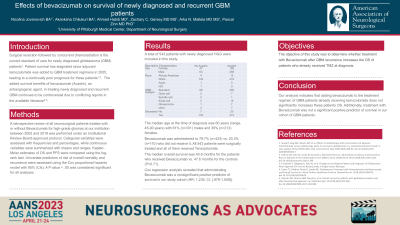Effects of bevacizumab on survival of newly diagnosed and recurrent GBM patients
Effects of Bevacizumab on Survival of Newly Diagnosed and Recurrent GBM Patients
Friday, April 21, 2023

.jpg)
Nicolina A. Jovanovich (she/her/hers)
Medical Student
University of Pittsburgh School of Medicine
ePoster Presenter(s)
Introduction: Surgical resection followed by concurrent chemoradiation is the current standard of care for newly diagnosed glioblastoma (GBM) patients. The added survival benefits of bevacizumab (Avastin), an antiangiogenic agent, in treating newly diagnosed and recurrent GBM continues to be controversial due to conflicting reports in the available literature. We aim to analyze the effect of bevacizumab on GBM patients' progression free survival (PFS) and overall survival (OS).
Methods: This single-institution retrospective analysis included 81 patients with newly diagnosed GBM presenting to our institution from 2009-2020. Analysis of bevacizumab's impact on patients’ progression-free survival (PFS) and overall survival (OS) was performed. Analysis was only performed on patients’ first recurrences.
Results: Fifty-six of the patients (69%) were male and twenty-five of the patients (31%) were female. Median KPS for the cohort at presentation was 90. Fifty-one of these patients received temozolomide alone (63%), while the other thirty patients received temozolomide + bevacizumab (37%). Of these patients, fifty-six progressed (69%), demonstrating a median KPS of 70 at progression. Seventy-six (93.8%) of these eighty-one patients are deceased. Median progression-free survival was not significantly different between patients treated with temozolomide + bevacizumab and patients treated with temozolomide alone (9 months vs. 6 months; p=.887, HR.962, CI [.557-1.661]). However, the median overall survival of patients treated with temozolomide + bevacizumab was significantly higher than that of patients treated with temozolomide alone (15 months vs 5 months; p=.015, HR.561, CI [.345-.914]).
Conclusion : Our analysis indicates that adding bevacizumab to the treatment regimen of GBM patients already receiving temozolomide significantly increases these patients’ OS without significantly increasing their PFS.
Methods: This single-institution retrospective analysis included 81 patients with newly diagnosed GBM presenting to our institution from 2009-2020. Analysis of bevacizumab's impact on patients’ progression-free survival (PFS) and overall survival (OS) was performed. Analysis was only performed on patients’ first recurrences.
Results: Fifty-six of the patients (69%) were male and twenty-five of the patients (31%) were female. Median KPS for the cohort at presentation was 90. Fifty-one of these patients received temozolomide alone (63%), while the other thirty patients received temozolomide + bevacizumab (37%). Of these patients, fifty-six progressed (69%), demonstrating a median KPS of 70 at progression. Seventy-six (93.8%) of these eighty-one patients are deceased. Median progression-free survival was not significantly different between patients treated with temozolomide + bevacizumab and patients treated with temozolomide alone (9 months vs. 6 months; p=.887, HR.962, CI [.557-1.661]). However, the median overall survival of patients treated with temozolomide + bevacizumab was significantly higher than that of patients treated with temozolomide alone (15 months vs 5 months; p=.015, HR.561, CI [.345-.914]).
Conclusion : Our analysis indicates that adding bevacizumab to the treatment regimen of GBM patients already receiving temozolomide significantly increases these patients’ OS without significantly increasing their PFS.
